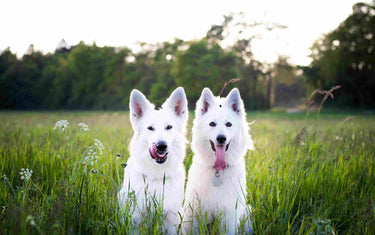7 min read / 18 February 2025 / yasmin sharp
What Essential Oils Are Safe to Diffuse Around Dogs?
Diffusers are ideal for spreading the benefits of essential oils around your home. Here's how to use them safely around your four-legged companions.
Share this post

Why do some pet owners choose to diffuse essential oils around dogs?
Why is it important to use dog safe essential oils for diffuser?
What essential oils are safe to diffuse around dogs?
How to use diffuser oils safe for dogs
What essential oils are toxic to diffuse around dogs?
What are the signs of toxicity in your dog?
Electric diffusers are handy, welcome additions to the home of any human. But how do our dogs feel about them?
Diffusers have blossomed into popularity in recent years, providing an easy, fuss-free way to disperse your favourite essential oils.
Whether you're using them for sleep, for energy, or simply to leave your spaces smelling good, diffusers are becoming more and more common as an accessory to the home.
With 34% of all UK households having a dog as a part of the family, it's likely some of us may have started worrying about how these machines are impacting our furry friends.
We've put together a handy guide of all the facts you need to know before choosing to diffuse around dogs, but remember to also always contact your veterinarian before trying them for yourself.
Are diffusers safe for dogs?Diffusers themselves are fairly harmless to dogs. While there are many different types to choose from, electric ones tend to be the most common, and don't themselves pose any particular risks. All your standard electric diffuser will do is turn a reservoir of water into a fine, quiet mist that disperses itself around the room. The true concern is less about the diffuser, and more about the essential oils you choose to put in it. |
Why do some pet owners choose to diffuse essential oils around dogs?
It's no secret that essential oils are great tools for humans.
They can help with any number of physical and mental conditions and can provide a safe and welcoming atmosphere for guests and household members alike.
When it comes to dogs, it's not unheard of for them to also experience many of the same aromatherapeutic benefits that we do.
Some oils can facilitate relaxation in your pet, while others can give them energy and keep them feeling happy.
That being said, even oils that seem like great assets for your dog need to be approached with caution.
Why is it important to use dog safe essential oils for diffuser?
Dogs have very naturally sensitive noses - allowing them to pick up on smells that humans may not be able to notice.
A 2021 study observed that a dog's olfactory system is up to ten times stronger than our own, with up to 300 million receptors in their noses alone. [1]
This means that, while there are some scents us humans find objectively pleasant, your dog is likely to be experiencing them at a much greater, much more intrusive level.
There are also some essential oils that are completely toxic for dogs to inhale.
To keep your four-legged friends safe, it's important to bear these oils in mind and to ensure they're used nowhere near any shared spaces.

What essential oils are safe to diffuse around dogs?
Some essential oils have been labelled as generally safe for dogs to inhale - but that doesn't necessarily mean they're full-proofed for safety.
Dogs, like humans, have different sensitivities, so it's always a good idea to contact your vet before using any kind of essential oil in your home.
With that in mind, we've detailed some of the best choices below.
1. Lavender essential oil
As with humans, lavender oil can be a useful remedy for promoting rest and relaxation in your dog.
A 2006 study on hyperactive dogs in cars noted the potency of these effects, confirming that those exposed to lavender had calmer dispositions throughout their journeys. [2]
Diffusing a little bit of lavender when your dog is feeling restless could therefore be a good way to naturally bring them back down to Earth.
2. Rosemary essential oil
Diffusing rosemary oil around your dog could help improve their energy levels as well as their levels of concentration.
This same effect can be seen in humans, so it's definitely a worthy addition if you're both looking for an easy pick-me-up.
3. Ginger essential oil
Ginger oil is great for our immune systems, and a 2020 study confirmed that the same could apply for our dogs, too. [3]
Not only that, but diffusing some ginger oil in a well-ventilated space could help your dog cope with motion sickness as well as general feelings of nausea.
4. Myrrh essential oil
Myrrh oil is a great festive alternative to some unsafe holiday favourites, like cinnamon.
Some sources have also noted its strengths for helping with your dog's tooth pain or any skin infections, however topical application is never recommended for dogs and should always be checked by a vet.
5. Frankincense essential oil
Like lavender, the comforting scents of frankincense oil are ideal for promoting peace and relaxation in your dog.
The same channels that are activated in the human brain as a result of frankincense inhalation can also affect your furry friends, so diffusing a drop or two of this oil is a sound choice if your dog suffers from stress or low mood.
How to use diffuser oils safe for dogsRegardless of whether an oil is considered "safe", or safe according to your veterinarian, it's still important not to go too overboard with diffusing around your dogs. Remember that a dog's nose is very sensitive, so even too much of a good scent can impact them negatively in the long run. We've broken down a list of steps to keep your pooch as safe as can be around a diffuser.
|

What essential oils are toxic to diffuse around dogs?
Some essential oils should never be diffused around dogs - even in small quantities.
Using them around your pooch could lead to toxic effects that are simply not worth the stress or harm to your pet.
Oils to stay away from include, but are not limited to:
- Citrus oils, like lemon or bergamot
- Pine
- Cinnamon
- Tea tree
- Ylang ylang
- Peppermint
For a full list of potentially toxic oils, you can check out our guide on harmful essential oils for pets.
What are the signs of toxicity in your dog?
If your dog does get exposed to a toxic essential oil, there are a few tell-tale signs that can help you catch the issue quickly.
Symptoms to look out for include:
- Drooling
- Laboured breathing
- Trouble walking
- Weakness
- Vomiting
- Irritation to the skin
If you notice any of these signs on your dog, take them to a veterinarian immediately or call your local animal poison helpline.
Be sure to turn off your diffuser and get your pet into some fresh air, too.
To avoid any toxic effects on your dog, always keep any essential oil bottles out of reach and follow the appropriate steps for safe diffusion.
Frequently Asked Questions
Can I apply essential oils topically on my dog?
Some people swear by the use of essential oils on their pet's fur and around their bodies, but this should be approached with caution.
As with humans, essential oils can be very potent on the skin of a dog, so be sure to always check with your vet before trying to use your oils in this way.
Are all diffusers potentially harmful to dogs?
There are many different types of diffusers out there, but not all require the same amount of caution.
Reed diffusers in particular are generally safe for households with dogs, though it's always suggested to keep them out of reach just in case.

Essential oils can be endlessly beneficial for our physical and mental health, as well as that of our dogs.
Using an electric diffuser can be a stylish and functional way to experience these amazing properties around your home, but it's also important to remember that dogs - while they may be our best friends - are not exactly like us.
So, the next time you have your eye on a new diffuser scent, be sure to check with your vet to ensure its complete safety around your furry friends, and follow the steps of proper diffuser use to keep them happy every time.
If you ever have any doubts on the safety of an oil, it's best to avoid use until you're certain it can be incorporated without risk.
[1] Agata Kokocińska-Kusiak et al. (2021) Canine Olfaction: Physiology, Behavior, and Possibilities for Practical Applications https://www.ncbi.nlm.nih.gov/pmc/articles/PMC8388720/
[2] Deborah L Wells (2006) Aromatherapy for travel-induced excitement in dogs https://pubmed.ncbi.nlm.nih.gov/16978115/
[3] Valentina Virginia Ebani et al. (2020) Use of Essential Oils in Veterinary Medicine to Combat Bacterial and Fungal Infections https://www.ncbi.nlm.nih.gov/pmc/articles/PMC7712454/









